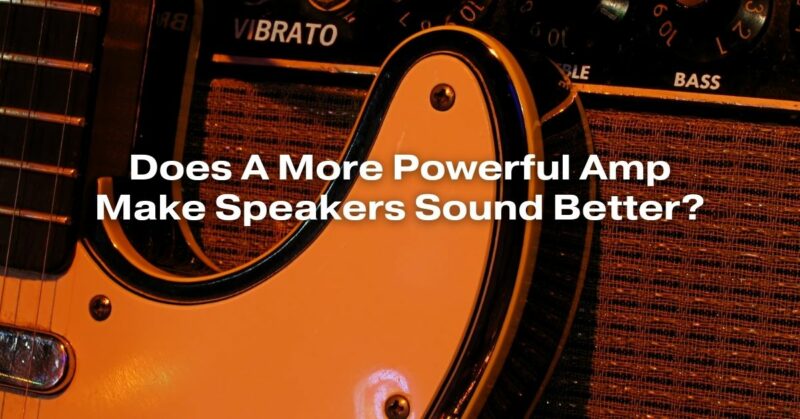The relationship between amplifiers and speakers in the world of audio equipment has been a topic of much debate and confusion among enthusiasts and casual listeners alike. One common question that often arises is whether a more powerful amplifier leads to better sound quality from speakers. To answer this question, it’s essential to delve into the intricacies of how amplifiers and speakers interact and how they collectively contribute to the overall audio experience.
Understanding Amplifiers and Speakers
Before we explore the impact of a powerful amplifier, it’s crucial to understand the basic functions of amplifiers and speakers. An amplifier, as the name suggests, amplifies audio signals from various sources, such as CD players, turntables, or digital media devices. It provides the necessary power to drive the speakers and produce sound. On the other hand, speakers are responsible for converting electrical signals back into sound waves that we can hear.
Power Ratings and Speaker Efficiency
Amplifiers are often rated in watts, indicating their power output. It’s a common misconception that higher wattage always leads to better sound quality. While a powerful amplifier can provide more headroom and handle dynamic peaks in the audio signal, it doesn’t necessarily mean it will make speakers sound better.
Speaker efficiency, measured in decibels (dB), plays a significant role in this equation. Speakers with higher efficiency can produce louder sound levels with less power. If a speaker has high efficiency, a moderately powered amplifier can drive it to satisfying volume levels without distortion. Conversely, a less efficient speaker might require a more powerful amplifier to achieve the same volume, but it won’t inherently improve the sound quality.
Clarity and Distortion
One of the critical factors affecting sound quality is distortion. Distortion can occur when an amplifier is pushed beyond its limits, leading to a harsh and unpleasant listening experience. A powerful amplifier, when matched correctly with speakers, can prevent distortion by providing ample power reserves. However, the mere presence of a powerful amplifier does not guarantee distortion-free sound. Proper matching between the amplifier and speakers is crucial.
Room Acoustics and Speaker Placement
Another aspect often overlooked in discussions about amplifier power is the room’s acoustics and speaker placement. The layout of the room, the materials it’s made of, and the placement of speakers can significantly impact the sound quality. A well-designed room and proper speaker placement can sometimes have a more substantial impact on the overall listening experience than the power of the amplifier.
Conclusion
In conclusion, while a more powerful amplifier can potentially enhance the listening experience by providing headroom and preventing distortion, it doesn’t inherently make speakers sound better. The key lies in finding a balanced match between the amplifier and speakers, considering factors such as speaker efficiency and the room environment. Moreover, investing in high-quality speakers and paying attention to room acoustics and placement can significantly contribute to achieving the desired audio quality.
Ultimately, the pursuit of excellent sound quality is a holistic endeavor that involves understanding the synergy between amplifiers, speakers, and the listening environment. It’s not just about the power of the amplifier but the thoughtful integration of all components, working in harmony to create a truly immersive and enjoyable listening experience.


